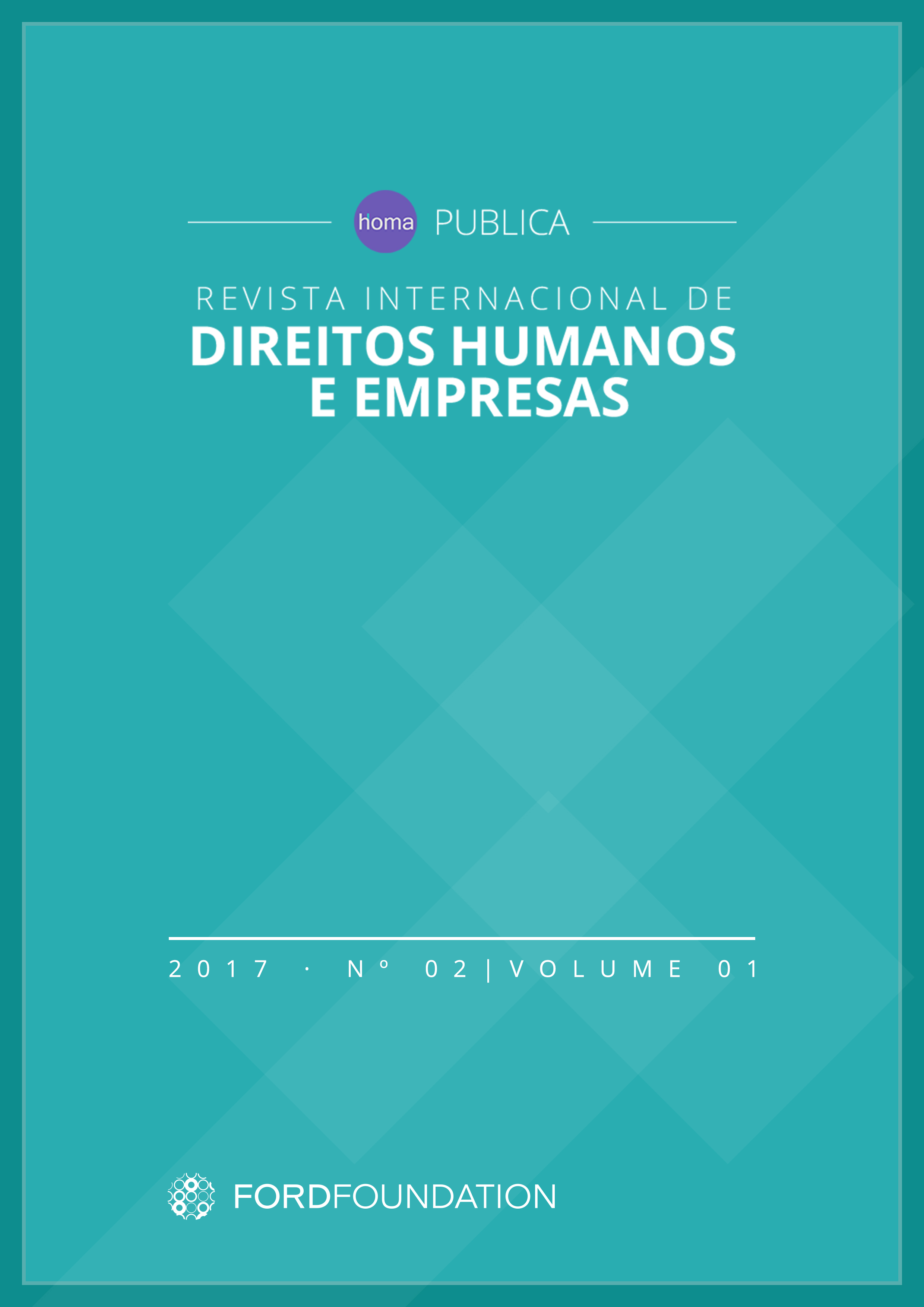Publicado 2017-07-31
Palabras clave
- Business,
- Human Rights,
- Transitional Justice,
- Treaty
Cómo citar
Resumen
Although the definition and purpose of transitional justice (TJ) does not preclude the inclusion of non-state business actors’ involvement in past authoritarian state or armed conflict violence, these types human rights violations (HRVs) are not included in formal TJ mandates. Nonetheless, in practice, TJ processes have included ad hoc measures to hold economic actors responsible for those violations. This article seeks to participate in the ongoing discussions and design of a UN-initiated proposal for a treaty on business and human rights by adding the TJ dimension. It draws on the Corporate Accountability and Transitional Justice (CATJ) data base to show that TJ initiatives have already incorporated economic actors in the investigations of past human rights abuses and how they have done so. It further explores what is missing from these processes and how a treaty on business and human rights could help fill those voids and advance victims’ rights to truth, justice, and reparations.
Descargas
Citas
ANON. n.d. International Center for Transitional Justice. Retrieved February 22, 2017 (https://www.ictj.org/about/transitional-justice).
BERNAL BERMÚDEZ, Laura. The Power of Corporations and the Power of People: Understanding Remedy and Corporate Accountability for Human Rights Violations. Colombia 2000-2014. University of Oxford.
BERNAZ, Nadia. Business and Human Rights History, Law and Policy - Bridging the Accountability Gap. New York: Routledge. 2017.
BOHOSLAVSKY, Juan Pablo and Veerle Opgenhaffen. The Past and Present of Corporate Complicity : Financing the Argentinean Dictatorship. Harvard Human Rights Journal 23:157–203. 2010.
CARRANZA, R. Plunder and Pain: Should Transitional Justice Engage with Corruption and Economic Crimes? International Journal of Transitional Justice 2:310–30. 2008.
CENTRO NACIONAL DE MEMORIA HISTÓRICA. Basta Ya: Colombia Memorias de Guerra Y Dignidad. Bogotá. Retrieved at http://www.centrodememoriahistorica.gov.co/micrositios/informeGeneral/descargas.html. 2013.
CLAPHAM, Andrew. Human Rights Obligations of Non-State Actors. Oxford: Oxford University Press. 2006.
DEFENSORIA DEL PUEBLO. Resolución Defensorial No. 39 - Violación de Los Derechos Humanos Por Siembra de Palma Africana En Territorios Colectivos de Jiguamiandó Y Curvaradó - Chocó. (39):1–42. Retrieved at http://defensoria.org.co/red/anexos/pdf/02/res/defensorial/defensorial39.pdf. 2005.
DEVA, Surya. Scope of the Legally Binding Instrument to Address Human Rights Violations Related to Business Activities. Retrieved at https://www.escr-net.org/sites/default/files/scope_of_treaty.pdf. 2017.
GRAY, D. Devilry, Complicity and Greed: Transitional Justice and Odious Debt. Law and Contemporary Problems (70). 2007.
HAYNER, Priscilla B. Unspeakable Truths: Confronting State Terror and Atrocity. Routledge. 2001.
INTERNATIONAL COMISSION OF JURISTS. The Scope of a Legally Binding Instrument on Business and Human Rights: Transnational Corporations and Other Business Enterprises. Geneva. Retrieved at http://icj2.wpengine.com/wp-content/uploads/2015/07/Global-ReportScopeBusinessTreaty-2015.pdf. 2015.
JUZGADO QUINTO PENAL DEL CIRCUITO ESPECIALIZADO DE MEDELLIN. Sentencia Condenatoria Y Absolutoria. 2014.
LESSA, Francesca, Leigh A. Payne, and Gabriel Pereira. Overcoming Barriers to Justice in the Age of Human Rights Accountability. Human Rights Quarterly 27:728–754. 2015.
LIM, Alwyn and Kiyoteru Tsutsui. Globalization and Commitment in Corporate Social Responsibility: Cross-National Analyses of Institutional and Political-Economy Effects. American Sociological Review 77(1):69–98. Retrieved at http://www.jstor.org/stable/23102579. 2012.
MAASSARANI, Tarek F. Four Counts of Corporate Complicity: Alternative Forms of Accomplice Liability Under the Alien Tort Claims Act. New York University Journal of International Law & Politics 39–65. 2005.
MICHALOWSKI, Sabine. Corporate Accountability in the Context of Transitional Justice. New York: Routledge. 2013.
OXFORD PRO BONO PÚBLICO. Obstacles to Justice and Redress for Victims of Corporate Human Rights Abuse. Oxford. 2008.
PATERSON, Pat. Transitional Justice in Colombia: Amnesty, Accountability and the Truth Commission. 2016.
PAUL, Geneviere and Judith Schönsteiner. Transitional Justice in the UN Guiding Principles on Business and Human Rights. Pp. 73–92 in Corporate Accountability in the Context of Transitional Justice, edited by Sabine Michalowski. New York: Routledge. 2013.
PAYNE, Leigh A. and Gabriel Pereira. Accountability for Corporate Complicity in Human Rights Violations: Argentina’s Transitional Justice Innovation. In Outstanding Debts to Settle: The Economic Accomplices of the Dictatorship in Argentina, edited by Horacio Verbitsky and Juan Pablo Bohoslavsky. Cambridge: Cambridge University Press. 2015.
PAYNE, Leigh A. and Gabriel Pereira. Corporate Complicity in International Human Rights Violations. Annual Review of Law and Social Sciences 12. 2016.
PAYNE, Leigh A. and Gabriel Pereira. The Business End of Human Rights during Dictatorships and Armed Conflict: New Accountability Challenges for Transitional Justice. Cambridge: Cambridge University Press. 2018
ROHT-ARRIAZA, Naomi. Reparations Decisions and Dilemmas. Hastings International & Comparative Law Review 27(157). Retrieved at http://repository.uchastings.edu/faculty_scholarship/691. 2004.
ROHT-ARRIAZA, Naomi and Katharine Orlovsky. A Complementary Relationship: Reparations and Development. in Transitional Justice Handbook for Latin America, edited by Félix Reátegui. ICTJ. 2011.
ROHT-ARRIAZA, N. and K. Orlovsky. A Complementary Relationship: Reparations and Development. Pp. 170–213 in Transitional Justice and Development. Making Connections, edited by Pablo de Greiff and R. Duthie. New York: Social Science Research Council. 2009.
RUGGIE, John Gerard. Just Business : Multinational Corporations and Human Rights. New York: W.W. Norton & Company. 2013.
SÁNCHEZ, Nelson Camilo. Corporate Accountability, Reparations, and Distributive Justice in Post-Conflict Societies. Pp. 114–30 in Corporate Accountability in the Context of Transitional Justice. New York: Routledge. 2013.
SECRETARY GENERAL. The Rule of Law and Transitional Justice in Conflict and Post-Conflict Societies. New York. 2004.
TEITEL, Ruti G. Transitional Justice Genealogy. Harvard Human Rights Journal 69. 2003.
THE INTERNATIONAL CENTER FOR TRANSNITIONAL JUSTICE. Truth Commissions. n.d.
UN GLOBAL COMPACT. UN Global Compact. Retrieved at http://www.unglobalcompact.org/abouttheGC/TheTenPrinciples/index.html. 2000.
UNITED NATIONS. Guiding Principles on Business and Human Rights. Retrieved at http://www.ohchr.org/Documents/Publications/GuidingPrinciplesBusinessHR_EN.pdf. 2011.
UNITED NATIONS SUB-COMISSION ON THE PROMOTION AND PROTECTION OF HUMAN RIGHTS. Norms on the Responsibilities of Transnational Corporations and Other Business Enterprises with Regard to Human Rights. 2003.
VAN ZYL, Paul. Promoting Transitional Justice in Post-Conflict Societies. in Transitional Justice Handbook for Latin America, edited by Félix Reátegui. Brasilia and New York: ICTJ. 2011.
VERBITSKY, Horacio and Juan Pablo Bohoslavsky. Cuentas Pendientes Los Cómplices Económicos de La Dictadura. Buenos Aires: Siglo Veintiuno Editores. eds. 2013.
VERBITSKY, Horacio and Juan Pablo Bohoslavsky. Outstanding Debts to Settle: The Economic Accomplices of the Dictatorship in Argentina. Cambridge: Cambridge University Press. eds. 2015.

